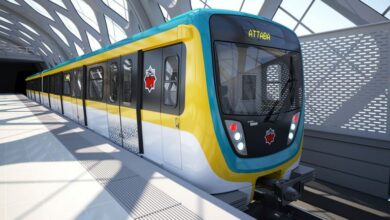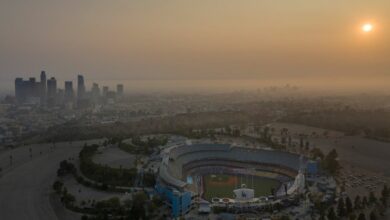After countless meetings addressing Monufiya's increasing traffic and pollution concerns in an environmentally friendly way, Governor Ashraf Hilal has approved the installation of bicycle lanes and pedestrian sidewalks in Sheban al-Kom, the governorate’s main city.
The issue was initially raised a year ago by former Minister of Transportation and current Prime Minister Essam Sharaf, as congestion and pollution levels were reaching intolerable levels.
Studies analyzing car pollution, air purity, and traffic congestion were conducted to figure out how to encourage citizens to rely less on motorized vehicles. The initiative is being referred to as "Massar al-Daragat" (Bicycle Paths).
“After much research, we found that many citizens would be willing to walk or take their bicycles out if the paths were more attractive and safer,” says Abdallah al-Sheikh, project coordinator. “We found that citizens always have a desire to be better people. So if the paths are paved perfectly, with sidewalks and bicycle racks, which makes travel more organized and comfortable, we’ve found that people will be eager to use them.”
The project will consist of 11.5 km of bicycle lanes that will circle and cut through all the main roads of Sheban al-Kom, starting with wide streets like Gamal Abdel Nasser and Talaat Harb
Sidewalks will be constructed on the outer edges of the streets, after which the bicycle lanes will be drawn in. The bicycle lanes will also be sectioned off from the roads to prevent cars from intruding, as well as to further encourage citizens stuck in traffic to use bicycles. As each individual street approaches completion, bicycle racks will also be installed in commercial areas so that bikes can be safely locked.
In designing the route, high-traffic destinations such as schools, shops and government institutions have been integrated into the design to ensure the routes are convenient for the city's inhabitants.
“Once the idea of the bicycle paths appeared, encouraging their use simply becomes a matter of making the bicycle paths an obviously better alternative,” continues Sheikh. “If you’re sitting in traffic in your car, day after day, just running small errands, and you see various people happily cycling past you and then cycling back, done with their errands within 10 minutes while you’re still stuck in traffic, you’ll be inclined to follow suit.”
The initiative will also include the establishment of various bicycle and repair shops throughout the city, as well as the introduction of government incentive programs that will make obtaining and repairing a bicycle cheaper.
These bike shops, as well as the construction of the paths themselves, are also intended to create further job opportunities for the people of Sheban al-Kom.
“Once a significant amount of the population integrates these non-motorized forms of transport into their daily lives, it will open the doors to a local industry that will not only improve people’s lives, but address the environment in a very effective way,” says Fady Zayd, governorate media spokesperson.
“At some point, air and noise pollution will slowly decrease alongside traffic because the inhabitants have decided so. I am convinced that it is the ideal way to address these environmental issues.”
Monufiya is the first governorate in Egypt to take such an initiative, and has received much support from the Egyptian Environmental Affairs Agency and the United Nations Development Program (UNDP), both of which are providing research and implementation guidance.
The UNDP has confirmed that it will fund up to 30 percent of the project's estimated LE10 million price tag, with the rest coming from the government and private investors.
After completion, the project will then be replicated in other cities within the Monufiya Governorate.
Asked why larger cities like Cairo haven't implemented similar strategies to ease pollution and congestion, Zayd said Monufiya was first because the decision was made within the governorate and only required approval from the people.
Other governorates such as Fayoum have shown some interest and the example Monufiya sets may spur them to follow suit.




